
Jamestown is a town in Newport County, Rhode Island, United States. The population was 5,559 at the 2020 census. Jamestown is situated almost entirely on Conanicut Island, the second largest island in Narragansett Bay. It also includes the uninhabited Dutch Island and Gould Island.

Chateau-sur-Mer is one of the first grand Bellevue Avenue mansions of the Gilded Age in Newport, Rhode Island. Located at 474 Bellevue Avenue, it is now owned by the Preservation Society of Newport County and is open to the public as a museum. Chateau-sur-Mer's grand scale and lavish parties ushered in the Gilded Age of Newport, as it was the most palatial residence in Newport until the Vanderbilt houses in the 1890s. It was designated a National Historic Landmark in 2006.

The Blackstone Canal was a manmade waterway, linking Worcester, Massachusetts, to Providence, Rhode Island, and Narragansett Bay, through the Blackstone Valley, via a series of locks and canals in the early 19th century. Construction started in 1825, and the canal opened three years later. After the opening of the Boston and Providence Railroad (1835), the canal struggled for business. Its transportation role was taken over by the Providence and Worcester Railroad, which completed a parallel line in 1847. The canal shut down in 1848. Several segments of the canal are preserved, and the canal alignment and remains are on the National Register of Historic Places.
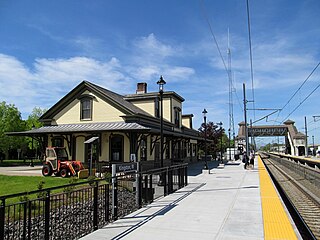
Kingston is a historic railroad station located on the Northeast Corridor in the village of West Kingston, in the town of South Kingstown, Rhode Island. It was built at this location in 1875 by the New York, Providence and Boston Railroad, replacing earlier stations dating back to the opening of the line in 1837. Current rail services consist of Northeast Regional trains in each direction, most of which stop at the station. Historically Kingston provided commuter rail service to Providence and Boston via Amtrak's commuter rail services. The MBTA is looking at extending their commuter service on the Providence/Stoughton Line.

The Redwood Library and Athenaeum is a subscription library, museum, rare book repository and research center founded in 1747, and located at 50 Bellevue Avenue in Newport, Rhode Island. The building, designed by Peter Harrison and completed in March 1750, was the first purposely built library in the United States, and the oldest neo-Classical building in the country. It has been in continuous use since its opening.
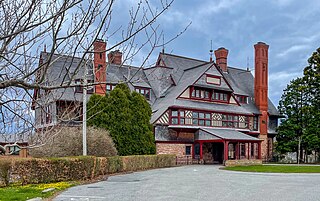
The William Watts Sherman House is a notable house designed by American architect H. H. Richardson, with later interiors by Stanford White. It is a National Historic Landmark, generally acknowledged as one of Richardson's masterpieces and the prototype for what became known as the Shingle Style in American architecture. It is located at 2 Shepard Avenue, Newport, Rhode Island and is now owned by Salve Regina University. It is a contributing property to the Bellevue Avenue Historic District.
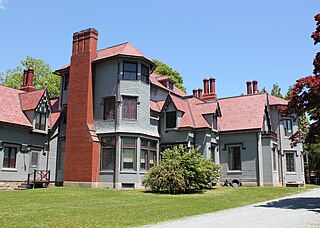
Kingscote is a Gothic Revival mansion and house museum at Bowery Street and Bellevue Avenue in Newport, Rhode Island, designed by Richard Upjohn and built in 1839. As one of the first summer "cottages" constructed in Newport, it is now a National Historic Landmark. It was remodeled and extended by George Champlin Mason and later by Stanford White. It was owned by the King family from 1864 until 1972, when it was given to the Preservation Society of Newport County.
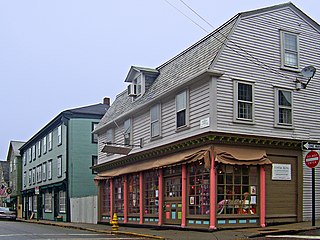
The Newport Historic District is a historic district that covers 250 acres in the center of Newport in the U.S. state of Rhode Island. It was designated a National Historic Landmark (NHL) in 1968 due to its extensive and well-preserved assortment of intact colonial buildings dating from the early and mid-18th century. Six of those buildings are themselves NHLs in their own right, including the city's oldest house and the former meeting place of the colonial and state legislatures. Newer and modern buildings coexist with the historic structures.

The College Hill Historic District is located in the College Hill neighborhood of Providence, Rhode Island. It was designated a National Historic Landmark District on December 30, 1970. The College Hill local historic district, established in 1960, partially overlaps the national landmark district. Properties within the local historic district are regulated by the city's historic district zoning ordinance, and cannot be altered without approval from the Providence Historic District Commission.

The Perry Mill is a historic mill building at 337 Thames Street in Newport, Rhode Island. It is a large five-story stone structure on the Newport waterfront. It was built in 1835 by master stonemason Alexander MacGregor as part of an initiative to boost the city's flagging economy. Of the four mills built in the 1830s only this one and the Newport Steam Factory survive. This building was originally four stories when built.

The Army and Navy YMCA is a historic YMCA building at 50 Washington Square in Newport, Rhode Island. It is a five-story concrete, masonry, and brick building, designed by Louis E. Jallade and erected in 1911 by the Norcross Brothers. It occupies a small, irregularly-shaped city block at the upper end of Washington Square, Newport's historic civic center. The building was constructed in a Beaux Arts style, with limestone finish predominating on the main facades, with some terra cotta paneling. Mrs. Thomas Emery, a philanthropist from Cincinnati, Ohio, funded its construction to provide services for Navy members when Newport was a major center of the United States Navy. YMCA closed after the Navy significantly reduced its presence in Newport in 1973. The building now serves as low income housing.
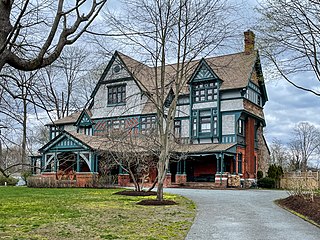
Charles H. Baldwin House is a historic house on Bellevue Avenue in Newport, Rhode Island, United States, that is part of the Bellevue Avenue Historic District, but is individually listed on the National Register of Historic Places (NRHP).

The Jamestown Windmill is a smock mill in Jamestown, Rhode Island within the Windmill Hill Historic District on North Road north of Weeden Lane.
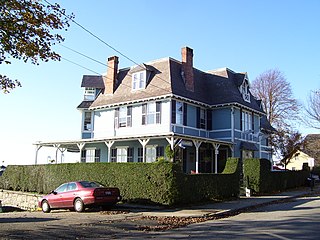
The William King Covell III House, originally Villa Edna but now known as the Sanford-Covell Villa Marina, is historic house at 72 Washington Street in Newport, Rhode Island.
The Jamestown Archeological District is an expansive archaeological district which is the site of a major prehistoric Native American settlement in Jamestown, Rhode Island. The full extent of archaeologically-sensitive areas has not been fully identified, but is known to extend from Narragansett Avenue in the south to Rhode Island Route 138 in the north, and from Narragansett Bay in the west to North Road. The district overlaps the historically significant Windmill Hill Historic District, and the nearly 300-acre (120 ha) Watson Farm. The district includes one of largest Native American burying grounds in New England, and includes evidence of occupation dating to 3,000 BC.

The Newport Steam Factory is an historic building at 449 Thames Street in Newport, Rhode Island. It is a 3+1⁄2-story stone structure, 120 feet (37 m) by 48 feet (15 m). It was built in 1831 by a group of local businessmen in an effort to boost the local economy, which had suffered since the British occupation during the American Revolutionary War. The building was used as a cotton mill until 1857. In 1892 it was purchased by the Newport Illuminating Company. It is now part of the International Yacht Restoration School.

East Greenwich Historic District is a historic district encompassing the historic commercial and civic heart of East Greenwich, Rhode Island, United States. The district bounded on the east by Greenwich Cove, an inlet on Narrangansett Bay, on the south by London and Spring Streets, on the west roughly by Park Street, and on the north by Division Street. The district extends westward on Division Street as far Dark Entry Brook, and the district properties on its north side now lie in the city of Warwick. East Greenwich was settled in 1677 with its town center growing in the district, with a rural farm landscape to the west. The area's road network had begun to take shape by the mid-18th century, and the town center was industrialized in the 19th century.

Fry's Hamlet Historic District is a historic district in East Greenwich, Rhode Island. The district encompasses about 272 acres (110 ha) of a predominantly rural and agricultural landscape. The central characteristic of the district is a cluster of three farmsteads, including four primary dwellings, four barns, and numerous additional outbuildings. Three of the four houses were built in the 18th century, and are associated with the Fry and Spencer families that long farmed this area.

The Conanicut Friends Meetinghouse is a historic Quaker meeting house at the junction of North Road and Weeden Lane in Jamestown, Rhode Island.
The Thomas Carr Farmstead Site is a historic archaeological site in Jamestown, Rhode Island. Located in the vicinity of Tashtassuc Road and Eldred Avenue, the site was the farmstead for the locally prominent Carr family from the late 18th century into the 19th century.






















